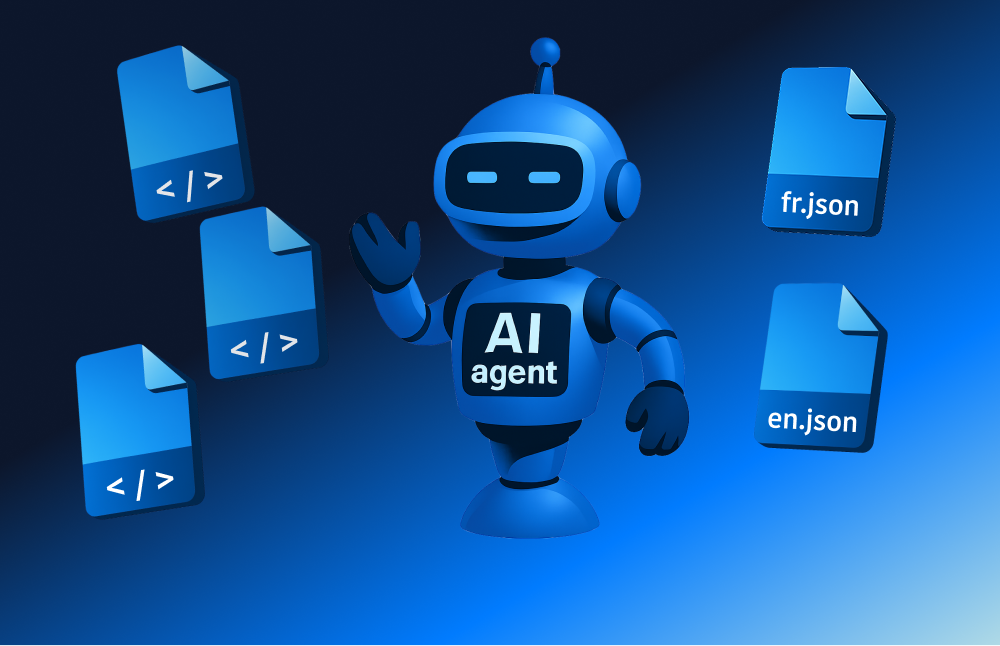New! Live-edit your app's wording with our Chrome extension – now available

For developers
One-click install (no script needed) to release faster and save a lot of time.
For wording owners and reviewers
Translations tailored to your brand and seamless copy edit without the devs defocus.

Published June 26, 2025 in Industry
Internationalize your codebase in under an hour with the Kilo Code AI Agent
How we internationalized our React codebase in under an hour with Kilo Code. AI agents like Kilo Code automate i18n extraction, turning a tedious process into a fast, reliable workflow.
At Prismy, we used to see internationalization as a massive headache: tedious, time-consuming, and with little immediate business value. But that was before the rise of AI agents like Kilo Code.
The classic problem: hitting the i18n wall
Early-stage teams move fast. User-facing texts are hardcoded everywhere. But the day inevitably comes when you need to support a second language. And that's when the fear kicks in:
- hundreds of files to modify,
- risk of git conflicts,
- weeks of manual work.
Some teams keep postponing. Others hire freelancers. But today, there's a much faster, scalable option.
AI agents like Kilo Code change the game
Where a human developer would painfully hunt for hardcoded strings, an AI agent like Kilo Code excels:
- identifying user-facing texts,
- cleanly extracting them into translation files with well-organized namespaces,
- continuously ensuring the codebase stays functional.
We tested Kilo Code on a reasonably large React project: 286 files, including 121 with hardcoded text. The result? Complete internationalization in under one hour.
🛠️ Our process
Our starting stack
- Frontend: React
- Backend: Node.js
- Goal: extract all hardcoded English strings
- AI tool: Kilo Code (VS Code extension)
- Translation management: Prismy
1. Installing Kilo Code
- Install the extension in VS Code
- Provide the OpenAI API key
- Select the
orchestratoragent (which coordinates thecode,debug, andarchitectsub-agents)
2. The prompt we used
Here is the prompt we provided to Kilo Code to launch the mission:
We need to internationalise our codebase, currently hardcoded in English.
What you need to do:
- knowing that our stack is JS/TS ; react on the front and node in the backend, choose i18n libraries compatible with both front & back, at least with the same syntax
- setup the lib and put a language selector in the user setting (do not need to be persisted in the backend for now)
- browse all the files of our codebase, and identify user-facing hardcoded texts, use the i18n library
- make sure to smartly use the i18n namespace features, so the keys are well sorted in the file
- for now, only create the key/values for the english file, we will later fill the french, do not translate anything for now
- make sure the project builds and run
3. The AI agent at work
Within minutes:
- Kilo Code installed
i18next(smart choice, even though we hadn't specified any library), - updated the configuration,
- started extracting hardcoded strings,
- ensured the app still compiled correctly after each change.
Watching files edit themselves live was truly impressive. After about 5 minutes, the project was partially internationalized and still fully functional.
4. Real-time collaboration
During the first pass, a namespace config issue caused keys to appear in the UI instead of translated texts. I simply sent a screenshot via Kilo Code's built-in chat. Within seconds, the agent identified and fixed the problem without me writing any code.
5. Divide and conquer
Instead of running a full extraction at once, I proceeded feature by feature (about 20 files per batch). After roughly ten iterations and less than an hour of actual work, the entire codebase was internationalized.
One PR later: done.
✨ The next step: scaling translations with Prismy
With the i18n foundation laid by Kilo Code, we plugged in Prismy to industrialize translation management:
- automatic glossary generation,
- custom AI prompts for consistent translations,
- in-PR generation and review,
- live editing via app or Chrome extension,
- business-friendly interface that requires zero developer involvement.
In short: express internationalization is now possible
- 1 specialized AI agent: Kilo Code
- 1 well-crafted prompt
- A few targeted iterations
- Result: fully i18n-ready codebase in under an hour
- Ongoing translation management powered by Prismy
👉 Huge kudos to the Kilo Code team for this flawless execution.
If you're still hesitant about tackling internationalization: now is the time. AI agents are ready.
Don't miss our industry insights!
Get the latest insights on localization, AI translations, and product updates delivered to your inbox.
No spam, unsubscribe at any time. We respect your privacy.
